#sri lanka conferences
Explore tagged Tumblr posts
Note
Hey there i really love ur art soo much but i have an question who you ship with sri lanka, :D ( idk bangladesh, maldives india or mauritus?idk and thank you.!!!
Hmmm, sadly I have to say that I don’t really ship Miss Sri Lanka with anyone! All her relationships are platonic in my mind hahah
Sri thinks Bangladesh is a nice kid even if he is a tad reserved (in contrast to Pakistan and India) and generally prefers to take his side over the other two. Along with their historical ties, they just get along well and can more easily hang out as pals!
Her and Maldives have a close, more sibling-like relationship and she’s very fond of them! (Havent decided on a gender yet for my Maldives OC) She tries to act like an older sister to Maldives, and their relationship is probably Sri’s closest with another nation tbh~
She thinks India’s personality is irritating and that he pokes his nose into her business too often but they’ve known each other for a really long time so they can get along as long as they stay away from some more contentious topics and don’t talk for too long
Compared to the others, she’s not as close with Mauritius, but thinks he’s a nice lad despite the disagreement here and there, and occasionally speak. Mauritius is generally a sociable guy and is friends with a lot of people, and Sri primarily thinks of him as an acquaintance and coworker.
#thank you for your kind words!!#ask#anonymous#hetalia#hetalia ocs#hws india#hws sri lanka#hws Maldives#hws Mauritius#hws bangladesh#gosh I need to draw Maldives#maldives and sri totally room together whenever they travel for world conferences and stuff#hetalia headcanons
24 notes
·
View notes
Text
सुरक्षा सम्मेलन के लिए श्रीलंका पहुंचे अजीत डोभाल ने राष्ट्रपति विक्रमसिंघे से की मुलाकात, जानें किन मुद्दों पर हुई चर्चा
Srilanka News: राष्ट्रीय सुरक्षा सलाहकार (एनएसए) अजीत डोभाल ने शुक्रवार को श्रीलंका के राष्ट्रपति रानिल विक्रमसिंघे से मुलाकात की और द्विपक्षीय आर्थिक सहयोग पर चर्चा की। कोलंबो सुरक्षा सम्मेलन में भाग लेने के लिए डोभाल गुरुवार को कोलंबो पहुंचे। यह सम्मेलन शुक्रवार को आयोजित किया गया। डोभाल ने राष्ट्रपति सचिवालय में विक्रमसिंघे से मुलाकात की। राष्ट्रपति मीडिया डिवीजन ने कहा कि दोनों ने श्रीलंका…
0 notes
Text



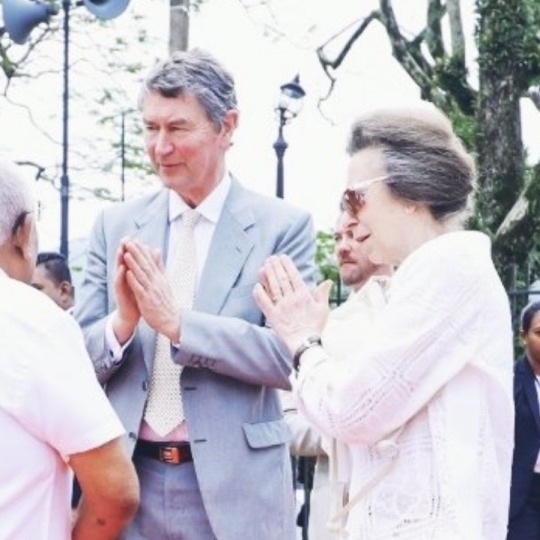
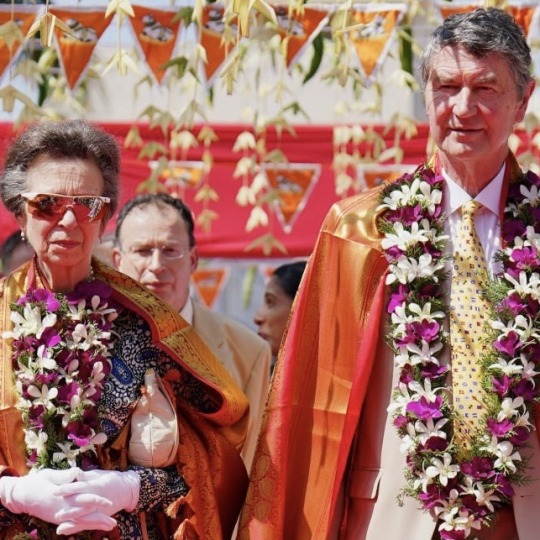
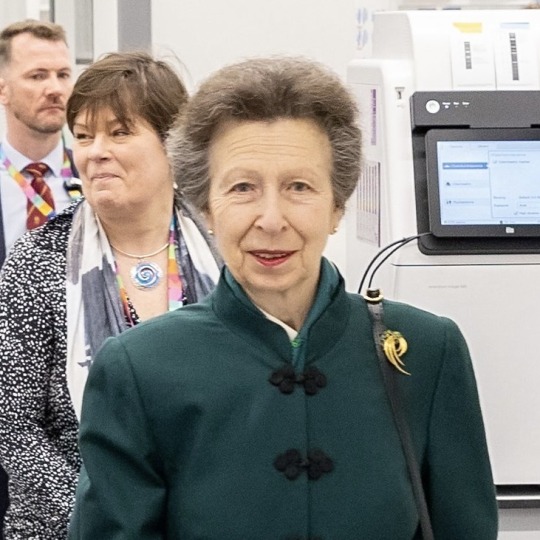


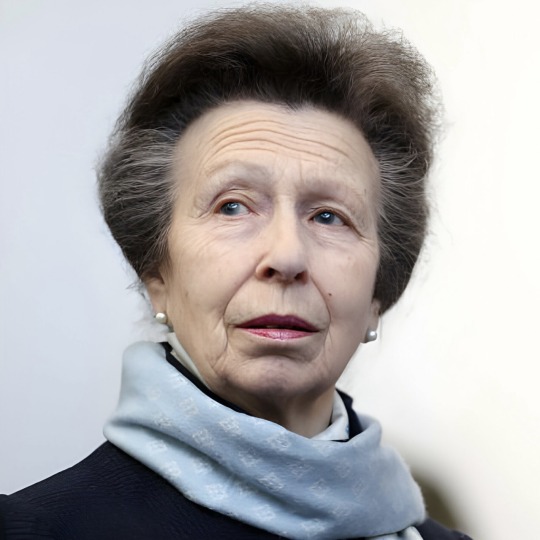
The Princess Royal’s Official Engagements in January 2024
04/01 With Sir Tim As Honorary President, attended the Oxford Farming Conference.
05/01 unofficial Sir Tim, as Trust President of the Gloucestershire Warwickshire Railway, visited emergency work at the Stanway Viaduct near Toddington. 🦺🚂
10/01 Princess Anne, accompanied by Sir Tim, carried out the following engagements in Colombo to commemorate the 75th Anniversary of United Kingdom-Sri Lanka Bilateral Relations;
As President of the United Kingdom Fashion and Textile Association, visited MAS Active in Katunayake. 👚
As Patron of Save the Children UK, visited the Save the Children Sri Lanka Head Office to mark its 50th Anniversary. 👧
As Patron of Save the Children UK, visited a Save the Children Sri Lanka programme at Lady Ridgeway Hospital for Children. 🏥
Called upon The President of the Democratic Socialist Republic of Sri Lanka and Mrs Wickremesinghe at The President's House. 📩
Attended a Dinner given by The President of the Democratic Socialist Republic of Sri Lanka and Mrs Wickremesinghe at The President's House to commemorate the 75th Anniversary of United Kingdom-Sri Lanka Bilateral Relations. 🍽️
11/01 Princess Anne, accompanied by Sir Tim, carried out the following engagements in Kandy and Jaffna to commemorate the 75th Anniversary of United Kingdom-Sri Lanka Bilateral Relations;
Visited the Temple of the Sacred Tooth Relic, Sri Dalada Maligawa in Kandy. 🛕
Met representatives of the Tamil Community at Jaffna Public Library. 📚
Visited the Halo Trust De-mining site, the United Nations Development Programme and International Organisation for Migration Resettlement site in Muhamalai. 🧨
12/01 Princess Anne, accompanied by Sir Tim, carried out the following engagements in Colombo to commemorate the 75th Anniversary of United Kingdom-Sri Lanka Bilateral Relations;
Visited the British High Commission Office. 🇬🇧
As President of the Commonwealth War Graves Commission, laid a wreath at Jawatte Cemetery. 🪦
Visited Vajira Pillayar Kovil Hindu Temple 🛕
As President of the English-Speaking Union of the Commonwealth, visited the British Council. 🏴🗣️
As President of the Mission to Seafarers, visited the Mission to Seafarers Colombo. ⛵️
Visited Hatch Works. 📆
As President of the Mission to Seafarers, attended a Key Supporters Reception at the Cathedral of Christ the Living Saviour. ⛪️
Attended a Reception given by the British High Commissioner to Sri Lanka at the Residence in Colombo. 🍹🇬🇧🇱🇰
16/01 As Patron of Police Treatment Centres,visited Castlebrae Treatment Centre in Perth. 👮🩺
As Vice President of the Royal Scottish Geographical Society, and Former Patron of the Heart of Arabia Expedition, attended a Reception at the Royal Scottish Geographical Society. ��
Opened the Vertical Farm Engineering Innovation Centre in Inverkeithing. 🌾⬆️
17/01 Held an Investiture at the Palace of Holyroodhouse.🎖️
As Chancellor of the University of Edinburgh, attended a Reception to mark the 60th Anniversary of Computer Science and Artificial Intelligence and later opened the Institute for Regeneration and Repair at the University. 🎓🎮
As Honorary Member of the New Club attended the 70th Anniversary Amalgamation Dinner. 🍽️
18/01 As President of the UK Fashion and Textile Association, visited Advanced Clothing Solutions in Motherwell. 👗
As Patron of Citizens Advice Scotland, visited Hamilton Citizens Advice Bureau. 👩⚖️
23/01 Opened the Medical Research Council Laboratory of Medical Sciences at Imperial College NHS Hospital in London. 🏥
As Patron of Livability, attended the Thanksgiving Service to mark the 180th anniversary at All Hallows by the Tower. 🎂⛪️
As Royal Honorary Colonel of the University of London Officers’ Training Corps, attended the Annual Reception at Yeomanry House. 🎓🫡
24/01 On behalf of The King, held an Investiture at Windsor Castle. 🎖️
As Patron of Save the Children UK, visited the London Head Office. 👧👦
As President of the City and Guilds of London Institute, visited Cox Workshops Limited in London. 🛠️
25/01 As Royal Patron of the National Coastwatch Institution, visited Cromer Station. 🛟
As President of the Royal Yachting Association, opened Norfolk Schools Sailing Association’s new facilities at Filby Centre, Norfolk. ⛵️
As Patron of National Association of Official Prison Visitors, visited HM Prison Norwich. 🔗
30/01 As Patron of Save the Children UK, visited the Stockton Heath Charity Shop. 🛍️
Visited Jodrell Bank Observatory UNESCO World Heritage Site at the University of Manchester. 🌌🪐
As President of the Riding for the Disabled Association, opened the new Centre and Platinum Jubilee Stables at Reaseheath Equestrian College in Nantwich. 🏇🏼
31/01 Held an Investiture at Buckingham Palace.🎖️
As Royal Fellow of the Royal Academy of Engineering, attended the 10th Anniversary Reception of the Africa Prize for Engineering Innovation at Prince Philip House in London. 🏆
Total official engagements for Anne in January: 41
2024 total so far: 41
Total official engagements accompanied by Tim in January: 17
2024 total: 17
#january was so fab#in royal watching may i add 😂#not irl#i loved the sri lanka tour 🇱🇰#lots of rugby for the next 2 months! and i am very excited#princess anne#princess royal#tim laurence#timothy laurence#january 2024#aimees unofficial engagement count 2024#i am keeping track of everyone else’s engagements i just aren’t posting them#if you wanna know their numbers please dm me
32 notes
·
View notes
Text
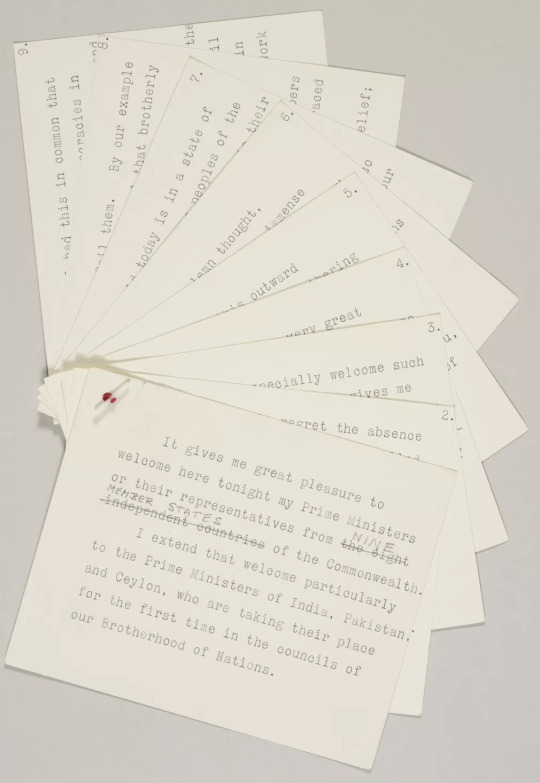
King George VI’s speech, with alterations in his own hand, given at a dinner party for the Commonwealth Prime Ministers on 13 October 1948. // © Royal Archives
The events of the Second World War led to a subtle change in relations between the nations of the Empire: there was a much greater feeling of the countries being ‘equal but independent Nations’ than previously. During the war, meetings had been held in London of the Prime Ministers of the Dominions (Canada, Australia, New Zealand, South Africa - and Southern Rhodesia, which had traditionally held a sort of hybrid status between colony and Dominion) and the British Prime Minister to discuss the best way to co-ordinate the war effort. Then in 1948 a conference was held, again in London, this time attended by the Prime Ministers, or their representatives, not only of the old Dominions but also of the new ones of India, Pakistan and Ceylon (Sri Lanka). This conference was arranged to allow the ‘Brotherhood of Nations’ to meet to discuss common problems and issues in the post-war world, and also to introduce the Prime Ministers of the new nations.
The Prime Ministers arrived in London in October and were received by King George VI individually. On 13 October a large dinner was held for them at Buckingham Palace, at which the King made this speech. In it he talked about the ‘high value’ he set on ‘personal contacts between those responsible for guiding our affairs in the different parts of the Commonwealth’. He also said that he would like these meetings to be held from time to time in different Commonwealth capitals. The Commonwealth Heads of Government Meeting is now held every two years, hosted by a different country of the Commonwealth. Addressing the Prime Ministers, the King pointed out that between them they were charged with the good government of more than five hundred million people, but that indirectly their responsibilities extended to many millions more. The world was looking for peace and it expected the Commonwealth of Nations to play a leading part in that process:
Our Commonwealth has always stood for certain principles, fundamental to the good of Humanity; it has never countenanced injustice, tyranny, or oppression. The self-governing members of the Commonwealth have always embraced peoples of different upbringing, social background and religious belief; they have all had this in common that they were peace-loving democracies in which the ideals of political liberty and personal freedom were jealously and constantly preserved.
King George VI, like many other public speakers, often had his speeches typed out on cards such as these, which he would then read and alter if necessary. There are many such examples in the Royal Archives, and they show that by this date the King, who, as is well known, had suffered from a speech impediment earlier in his life, was able to deliver long speeches with confidence.
TREASURES FROM THE ROYAL ARCHIVES (2014)
16 notes
·
View notes
Text
Doug’s fresh from a trip across Southeast Asia, and in today’s episode, we dive into the contrasts between East and West. From the comparative pristine streets of Thailand to the hotel standards in Malaysia, Doug lays out why he believes that part of the world is the place to be – and what that means for those of us still dealing with the decay of Western cities.
We also get into some historical events of the day, from Encyclopedia Britannica’s pages to an old encounter with Sean Connery. And for anyone keeping an eye on the bond markets and the dollar, we’ve got a few cautionary tales. From Yellen’s bizarre “omen” during a press conference to bank losses that dwarf those of 2008, the signs for the dollar aren’t good.
Get comfortable; this episode is packed with Doug’s classic take on culture, opportunities in oddball markets, and a sobering look at the U.S. financial system’s fragile state.
Timestamps
00:00 - Introduction and Doug’s return from Asia
01:00 - Encyclopedia Britannica and today's historical events
03:00 - Halloween, secularization, and cultural shifts
05:00 - Doug’s experience almost meeting Sean Connery
08:00 - Doug’s reflections on Southeast Asia: Malaysia and Thailand
10:00 - Qatar and Emirates: Observations on airline quality
12:00 - Comparing infrastructure and service quality in Asia vs. the U.S.
15:00 - Discussing Sri Lanka's economy and opportunities
17:30 - Reflections on speculative opportunities in Sri Lanka
19:30 - Arthur C. Clarke’s connection to Sri Lanka
22:00 - Discussion on bond markets and the current U.S. financial climate
24:00 - Banking sector risks and bond yield trends
26:30 - The cost of elder care in Southeast Asia vs. the U.S.
30:00 - Social Security, Medicare, and U.S. budget challenges
32:00 - Reflections on upcoming U.S. elections and economic trajectory
34:30 - "Civil War" movie review and implications for U.S. stability
37:00 - Living through crisis: Ukraine and Sri Lanka analogies
38:30 - Tribute to Gonzalo Lira
5 notes
·
View notes
Text
Bibimbap Missiology
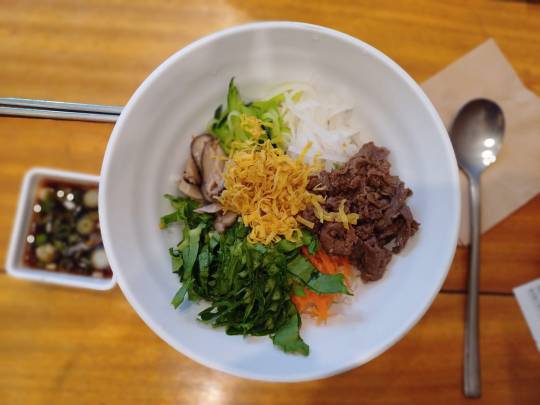
This is perhaps that closest pair of words I can think of to describe what just happened at the 4th Congress of the Lausanne Movement in Incheon, South Korea. The conference in itself is a very interesting theatre of so many tensions at work today in the evangelical community which includes the 'speech that shookt the L4' delivered by Dr Ruth Padilla DeBorst from Latin America.
But for those looking beyond the veneer of what was seen on stage, one of the critical aspects that needs attention is the tension arising from the push and pull of missiological perspectives. The theme of the congress itself is very telling: "Let the church declare and display Christ together." Three tarpaulins were put up, one emphasizing the word 'declare', the other 'display,' and the third one 'together.' Immediately, I thought, these visuals reveal where the movement is at in 2024:
Within Lausanne, there are those who wished to see that 'proclamation' will be emphasized more so that evangelical churches will not lose their fervent for evangelism and be markedly distinguishable from the mission trajectory of the World Council of Churches (WCC). They are the people who remembers the first Lausanne in 1974 as the necessary antidote to the waning evangelistic energy among the ecumenical circle. They celebrate the UPGs and other 'strategies' developed as the core strength of what Lausanne is and hope that the movement will continue to be at the cutting edge of coming up with similar 'strategies' to 'finish the task" of evangelizing the world. While some of them believe that the Gospel has to be and cannot afford not to be 'holistic', in practical and even theological sense, still yet 'priority' has to be given to finding ways of 'telling the Gospel' clearly and effectively (aka 'Prioritism). Ed Stetzer, regional director of Lausanne in North America, wrote' a post-conference reflection that articulates exactly this conviction.
But also within Lausanne are those who hope to see 'demonstration' to finally get the legitimization it deserves as a missional expression of what it means to be a witness of the Gospel. They come in many names and don different hats, e.g., faith-based development agencies, justice initiatives, social workers, community organizers, climate activists, among many others who are working to ensure that more people will experience the "fullness of life" in the here and now, aside from, of course, getting assured of 'eternal life' in the world to come. They are the people who remember the first Lausanne Congress in 1974 as the struggle of Majority World voices in disrupting the narrow, truncated, model of mission that developed in the West, or to recall a phrase that René Padilla used in his speech, the need for a more 'integral' mission as an antidote to the dominance of "a Gospel with no teeth." A younger leader from Sri Lanka, Nathanael Somanathan, member of Lausanne's current Theology Working Group, wrote a penetrating post-conf analysis that articulates this perspective.
50 years later, the tension between these two missiological camps remain, and the L4 congress is where they needed to discover how to share the same space, be together as brothers and sisters, talk with each other, and also find ways to work together. The big push for this in the congress is framed around the call for 'COLLABORATION'. The sessions and activities of the weeklong event were designed around this objective. The many tensions that transpired behind the scenes throughout the week are but indicators of how the movement is grappling with what happens when you ask advocates of justice & peace to share the same stage with heralds of justification & church planting. Bibimbap is only as good as the choice of side dishes to mix and how well everything will be tossed happily in the bowl. It cannot be truly enjoyed by eating the rice separately and each side dishes on its own as one would normally do with a rice and viand meal.
And this is where I guess the conference failed.
'Bibimbap' could have been a good metaphor for the congress to capture the changing landscape of today's Christianity that is going more and more global. But it turned out to be a missed opportunity. What the congress tried to do is to get different camps together, toss them in a single bowl, with the hopes of arriving at a dish that will be good for everyone, everywhere, and perhaps, for all time. The delegates heard of talks about resolving the tensions, managing the fractures, and finding a happy resolution. Together. Maybe the three tarpaulins were illustrative of how to make sure everybody will find their own happy space under the big tent of Lausanne.
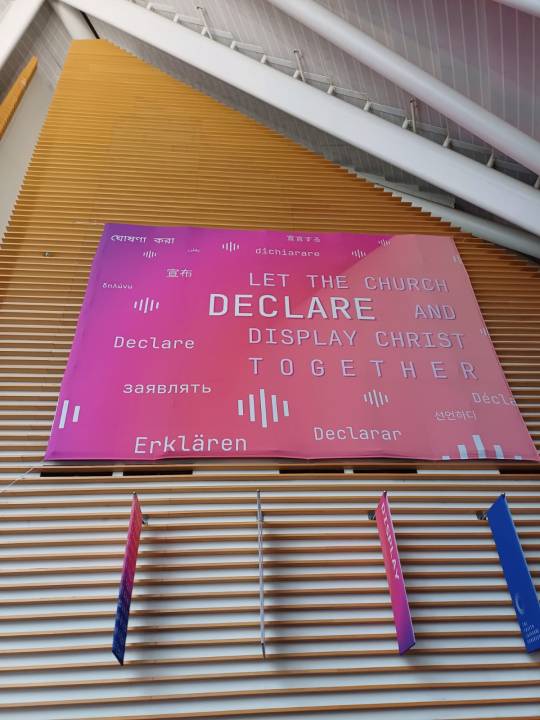
However, for both sides, the feeling is mutual in terms of disappointment. The 'declare' camp remains worried that the Seoul Statement has not gone far enough to ensure that evangelizing the lost, the last, and the least, while not the only task of God's people, shall, at the end of the day, be on top of everything else. The 'display' camp, on the other hand, were frustrated that not much space were given to articulate the cause of justice, peace, and reconciliation, and the very few times it was forcefully articulated on stage, the L4 organizers were quick to even issue a public apology!
The problem with a global missiology. The unhappy lot experienced by both parties during the L4, I think, is very much rooted in an imaginary that remains to be a sticky feature of evangelicalism -the yearning for a singular story that can define and unite the movement. In the field of missiology, the three previous Lausanne documents have been seen as building-up on each other with the hope of finally arriving at a more 'biblical' missiology, one that will be good for everyone, everywhere, and hopefully, for a really long, if not, all, time. Technically, the pursuit of a truly 'global' missiology for today's global church.
But such an endeavor will continue to be less than helpful. As Christianity re/emerges more and more in different parts of the world, it is becoming clear that the challenge has more to do with something beyond the preoccupation with constructing a global (applicable to all) perspective of mission for the evangelical community.
This challenge involves coming to terms with the reality that each locality, each community, each region of the world, faces a context, culture, and church histories that will demand approaches to doing mission which can only be articulated from within.
This has nothing to do with the usual approach of 'contextualizing' something that is global so that it becomes more palatable locally (think of making Bibimbap burgers or Bibimbap salad). It is more about recognizing that there is hardly such thing as 'global' and those that put itself forward as one are actually more appropriately labeled as 'colonial' for they are, in different ways, actually experienced as such. Bibimbap is a beloved Korean dish and best enjoyed in the Korean way of eating and for the L4 delegates the opportunity to enjoy it right where the dish originated -Korea. But to think of a 'global' Bibimbap that serves as a dish for everyone, everywhere, and for all time, is a big mistake.

Lately, I've been talking of how the theology of 'integral mission' has been less effective and became more contentious when it was 'Lausannized' (read as globalized!). It did not help that the Micah Declaration on Integral Mission was drafted in Oxford! Not a few who have encountered integral mission through these sources have thought of 'integral mission' as another 'colonizing' Western framework seeking embrace from their people. Not a few also missed the fact that the 'integral' in Integral Mission is not from the English word 'integrate' (fuse things together) but from what makes 'pan integral' (whole wheat bread) a more healthy choice of bread in the tables of South America. It does not help that even celebrated advocates of Integral Mission also omit the 'genealogy' and historical roots with the hope that a more 'abstracted' version shall be more helpful. But this proved to be really unfortunate.
Confronting colonial missiology. What Rene Padilla, Samuel Escobar, Kwame Bediako, John Stott, among others, accomplished, together, in 1974 is to remind the evangelicals molded in the tradition, history, and context of the Western hemisphere that the Western approach to doing mission does not (and cannot) apply to everyone else in the world. The other regions of the world, today dubbed as the Majority World, are facing battles of their own on how the Gospel will take root in the hearts and minds of their own people, amidst the social and political issues of their communities. It is naive to think that there is 'one' way to do address these multifaceted dimensions of mission and ministry across the world.
Integral Mission is a sharp critique, a necessary pushback, and also a concrete alternative from Latin America to what the West offers. It is a 'moment' in evangelical missiology that has the power to encourage the people of God in Africa, Asia, Oceania, and other regions of the Majority World to reimagine mission anew, and that to do so is not 'heretical' but actually truly 'missional.' It has the power to confront and undo the 'colonial captivity' that not a few in the Majority World continue to suffer from in subtle and hidden ways. This is the 'decolonial' edge of Integral Mission that got blunt when it was 'globalized' in the shape of the old colonial mold of Western missiology. Pan Integral missiology could have launched a thousand ships of missional expressions: adobo mission in the Philippines, Phin mission in Vietnam, Khao soi mission in Thailand, etc. A clear case of why it is not enough to be 'contextual', one also needs to be 'de-colonial' -basically an insistent conviction to root one's way of thinking from where one's feet land and straddle.
And so the struggle has to move beyond, and away from, whether Integral Mission or Prioritism will win as the 'official' evangelical missiology. Such a question can easily go down the path of colonial preoccupation disguised in the language of which one is more 'biblical'. The real work is how the different spaces and communities of evangelicals in different parts of the world can encourage one another to plant the seeds of the Gospel in their localities, sharpen each others perspectives and practices by exchanging notes, and celebrate the fact that it is in these diverse expressions and articulations lie the true strength and uniqueness of the 'church' spreading worldwide whom Christ continues to build and lead. Brings to mind a line that C. Rene Padilla wrote,
"Every culture offers a perspective on the Gospel that brings to light certain aspects of it that in other cultures have remained less visible or even hidden. From this perspective, the cultural differences that so greatly complicate intercultural communication become as advantage for understanding the multiform wisdom of God: they become channels for expressing aspects of the truth of the Gospel that a theology tied to only one culture might ignore all too frequently."
And this is also where a platform like the Lausanne Movement can best position itself in service -not as missiological policemen but as Gospel caterers. That is, a gastronomic platform that will go beyond extending and making the 'global' table more longer, but interrogating the very idea of having a single table! Inviting everyone to ask instead how things will be different if we celebrate the existence of more and many tables and encouraging people to stand-up, explore, and savor what other tables have to offer, not necessarily to copy one another but to be challenged to further deepen each other's work.
I have some ideas on what will happen when we switch from a globalized-bibimbap to single-origin coffee missiology but that will have to be for another post...
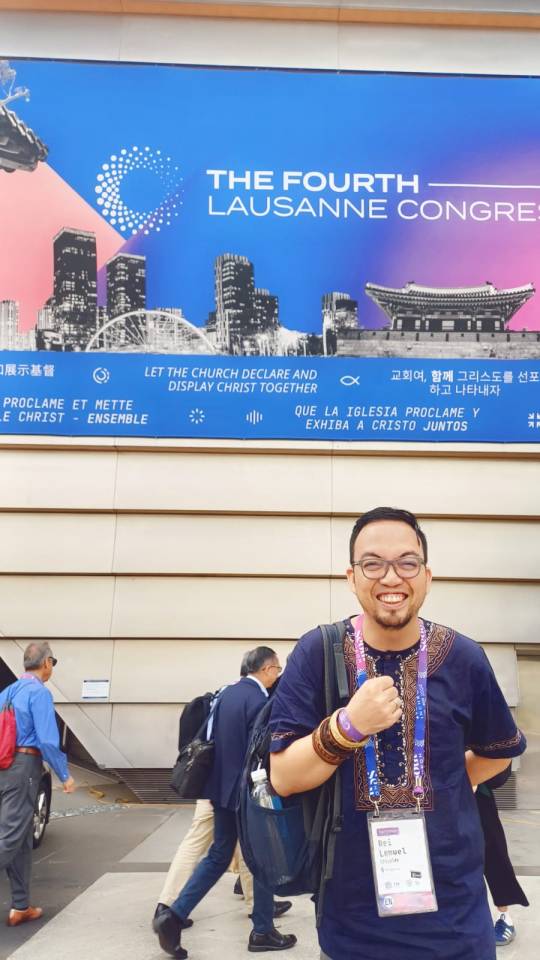
-Rants by Rei Lemuel Crizaldo on the recently concluded 4th Congress of the Lausanne Movement held in South Korea from September 22-28, 2024. NOTE: If you like a podcast (audio) version of this blog, please click here.
3 notes
·
View notes
Text
How can I get a PhD in Sri Lanka?
Embarking on a journey to attain a PhD in Sri Lanka can be an intellectually rewarding and transformative experience. With its reputable universities and vibrant academic culture, Sri Lanka offers a conducive environment for advanced research and study.
1. Choose Your Field of Study and Research Topic
The first step in pursuing a PhD is identifying your field of interest and a specific research topic. This decision is crucial as it will shape your entire doctoral journey. Ensure that your chosen topic aligns with current research trends and gaps within your discipline.
2. Find the Right University and Supervisor
Sri Lanka is home to several prestigious universities that offer PhD programs. Conduct thorough research to find a university that excels in your field of study. Equally important is identifying a potential supervisor whose expertise aligns with your research interests. A supportive and knowledgeable supervisor can significantly influence the success of your PhD journey.
3. Meet the Eligibility Criteria
To be eligible for a PhD program in Sri Lanka, you typically need a relevant master’s degree with a strong academic record. Some programs may also require a certain level of research experience or publications. Check the specific entry requirements of the universities you are interested in to ensure you meet their criteria.
4. Prepare Your Research Proposal
A well-structured research proposal is a critical component of your PhD application. Your proposal should clearly outline your research objectives, methodology, and the potential contribution to the field. It should demonstrate your understanding of the research problem and your ability to conduct independent research.
5. Apply to the Program
Once you have your research proposal ready, you can apply to the PhD programs at your chosen universities. This process usually involves submitting an application form, your research proposal, academic transcripts, and letters of recommendation. Some universities may also require you to attend an interview or pass an entrance examination.
6. Secure Funding
Funding is an essential consideration when pursuing a PhD. Explore various funding options, including scholarships, grants, and fellowships offered by universities, government agencies, and private organizations. Securing adequate funding will allow you to focus on your research without financial stress.
7. Enroll and Begin Your Research
Upon acceptance into a PhD program, you will enroll and begin your research journey. This stage involves conducting extensive research, collecting data, and regularly meeting with your supervisor for guidance and feedback. Engaging with the academic community through conferences and publications can also enhance your research experience.
8. Complete Your Dissertation and Defense
The culmination of your PhD journey is the completion of your dissertation, a substantial piece of original research. After writing your dissertation, you will defend it before a panel of experts. Successful defense of your dissertation will earn you the prestigious title of Doctor of Philosophy.
For those aspiring to reach new academic heights, NSBM Green University in Sri Lanka offers a dynamic and supportive environment for doctoral studies. With state-of-the-art facilities and a commitment to excellence, NSBM Green University can be an excellent choice for your PhD journey.
NSBM Green University

2 notes
·
View notes
Text
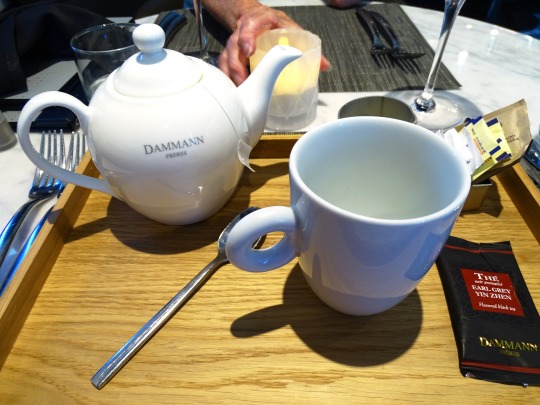











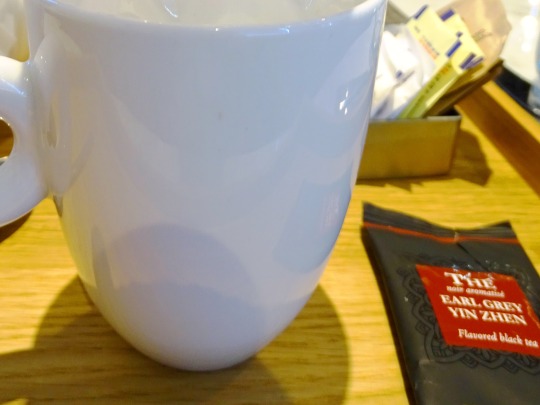



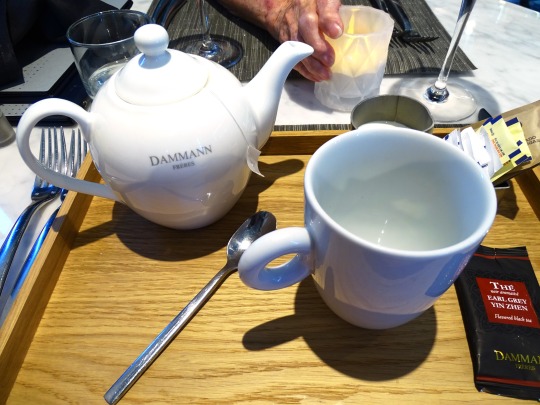

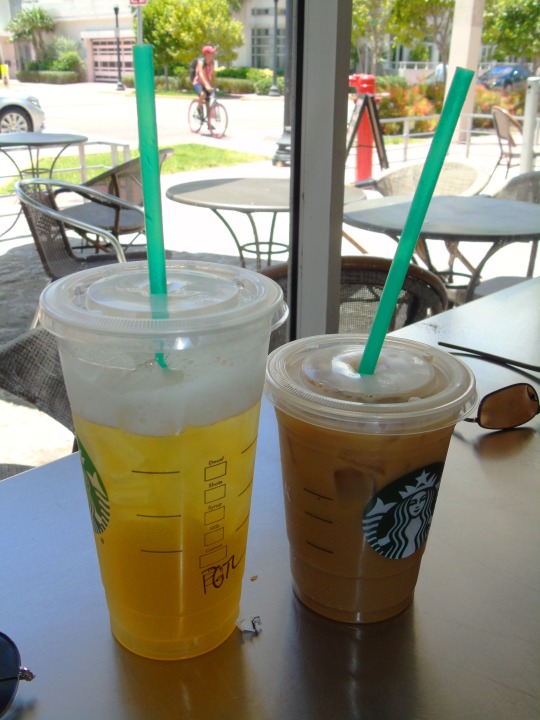




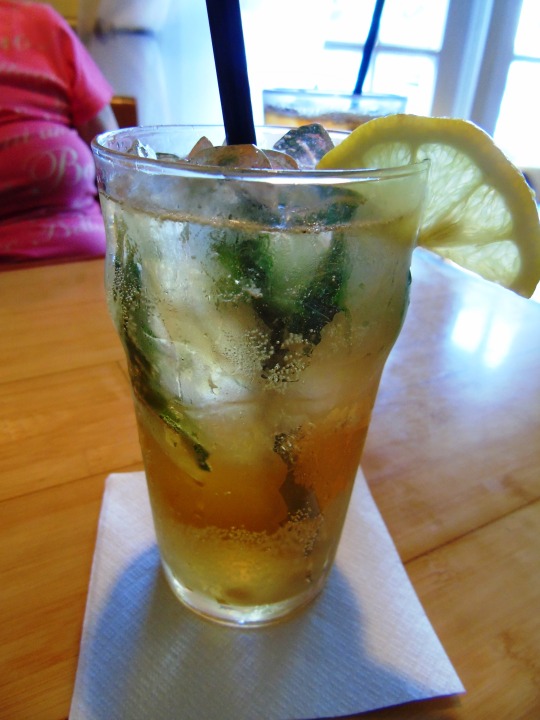




International Tea Day
While everyone loves a cup of tea, many of the workers and producers of that tea face poor conditions and pay. Help raise awareness and keep tea fair.
The tea industry provides millions of people around the world with cups of tea in the morning. One of the biggest producers of tea, India, recognizes the importance of tea in its communities and as a commodity for commerce.
However, much of the working conditions for those within the tea industry still need much improvement. If you think this holiday was about drinking tea, well think again! International Tea Day is all about the tea workers and bringing civil rights into action. Let’s see how this holiday came to pass.
Do you love a good cup of tea? While International Tea Day can certainly involve paying homage to tea, we should pay homage to those working in the tea industry. The best way to do this is by helping to raise awareness regarding their working conditions so they can be improved.
History of International Tea Day
The International Tea Day campaign was launched in 2005 by the trade unions, small tea growers and civil society organizations in Asia and Africa to address the issues of living wages for workers and fair prices for small tea producers.
The International Tea Conference in New Delhi came out with an International Declaration on the rights of workers and small growers to help regulate uneven competition, land ownership, safety regulations, rights of women, social security and living wages. Another organization, The Tea Board of India, proposed International Tea Day in hopes of it becoming an official holiday to the UN Food and Agriculture Organization.
This was proposed by chairman Santosh Kumar Sarangi in 2015. According to the chairman, the proposal of India was supported by countries such as Canada, the United States, European Union, Sri Lanka, China, Japan, Kenya, and Malawi. While the holiday doesn’t have official status, the goal of this holiday is to recognize the vulnerable situations that tea producers in India have with current living conditions and worker-related policies.
The day also focuses on deliberating on urgent issues such as residues, climate change, technology and trends on production and consumption in the tea industry. To observe this day, over 150 representatives from tea organizations gather and conduct a seminar to discuss the pervading problems the tea industry has as well as problems faced within their own country.
International Tea Day Timeline
2737 BC Tea is discovered as a beverage
Legend has it that Chinese Emperor Shen Nung is sitting beneath a tea tree while a servant boiled water for drinking. Some leaves fall into the cup and begin the practice of drinking what is now called “tea”.
1610 Tea comes to Europe
It is believed that the Dutch were the first to bring tea to Europe, just a few years prior to the introduction of coffee by Venetians.
1773 The Boston Tea Party occurs
With the intention of revolting against the high taxes levied by the British government without providing any voice, residents of Massachusetts throw tea into the Boston Harbor. “No taxation without representation” is the major complaint.
2004 International Tea Day is created
At the World Social Forum, International Tea Day is conceived and then celebrated the following years in New Delhi and Sri Lanka, then later in other tea-producing places like Nepal, Viet Nam, Bangladesh and others.
2019 United Nations adopts International Tea Day
After some years of advocating for its observance, International Tea Day is adopted by the United Nations General Assembly at the suggestion of the FAO Intergovernmental Group on Tea.
How to Celebrate International Tea Day
If you’re a lover of tea, then do some research about some of your favorite companies. Try looking up tea brands that support fair trade, and possibly switch to those brands to make a difference in the way you buy products such as tea. Use the hashtag #internationalteaday to help recognize it as an official holiday and educate others about the tea industry if you’re interested.
You could also use International Tea Day to try a variety of tea you have never had before. Matcha, for example, is highly popular as of late. You need to shop with care, though! The first thing you need to take a look at is how the Matcha has been produced and sourced.
You need to ensure that all veins and stalks have been removed so that there is not any bitterness and only the finest leaves should be used. Secondly, the color of the matcha powder is a significant factor. The greener the color is, the better. This is because the leaves are forced to overproduce chlorophyll because Matcha is shade-grown, which causes the vibrant green shade.
If the Matcha is yellow or brown in color, this is a sign that the leaves have not been properly shaded or that branches and stalks have been included. The price is the third factor to consider. Like most things, if you want quality, you can expect to pay a little bit more.
If something seems too good to be true, the chances are that it is. The feel of Matcha is also important. It should be a fine powder that is very silky. Last but not least, the taste is obviously a crucial attribute when it comes to quality. It should have a clean and naturally sweet taste.
Why not make some delicious baked green tea treats on International Tea Day and have a bake sale to raise money and awareness regarding working conditions in the tea industry? Green tea recipes are available in their abundance. People are actively searching for different ways to enjoy green tea. While green tea is delicious when simply mixed with hot water, there is nothing wrong with switching it up from time to time, especially on International Tea Day!
An easy and delicious recipe is Matcha Meringue Kisses. To make this you will need Matcha, sugar, egg whites, and powdered sugar. Begin by sifting together the Matcha and the powder sugar, and then whip the egg whites until they have soft peaks. Gradually add the sugar and whip until stiff peaks. Gently fold the Matcha into this mixture and then transfer to a pastry bag. Pipe the mixture into small kisses onto a baking tray and then bake for around an hour.
Or, why not make Green Tea Donuts? For this, you need green tea, honey, melted butter, milk, egg, salt, baking powder, sugar, and cake flour. You whisk the green tea, salt, baking powder, sugar, and flour. Add the honey, melted butter, milk, and egg, and then whisk. Use a pastry bag to pipe the batter into the mould. Then, simply bake the donuts for eight minutes. You can make your own glaze to go on the top – chocolate goes well!
Other delicious baked treats to try include green tea muffins, brownies and shortbread!
International Tea Day FAQs
What is International Tea Day?
Created to celebrate and pay tribute to the countries that produce tea to supply to the world, starting in India and moving to other places like Sri Lanka, Malawi, Uganda, Bangladesh, Vietnam and more.
When was International Tea Day first celebrated?
International Tea Day first got its start in 2004 when it was celebrated in New Delhi. It grew over the years and by 2019 the day was adopted by the United Nations General Assembly.
How to celebrate International Tea Day?
A great way to observe this day is by learning a bit more about the nations who produce tea for the world. Also, don’t forget to order a cup of fair trade tea for one, or take a friend out to enjoy a cuppa together.
What is the theme of International Tea Day?
The theme for this day devoted to tea producers changes each year, but some of the past themes have included themes such as Tea and Fair Trade or Harnessing Benefits for All from Field to Cup.
When is International Tea Day celebrated?
Taking place on May 21 of each year, International Tea Day originally took place on December 15 from 2005 when it was often only celebrated by tea-producing countries. It changed to May 21 when the UN adopted the day.
Source
#Earl Grey#Earl Grey Tea is my favorite tea#Computer tea Earl Grey hot#USA#I don't like coffee#I only drink tea#original photography#always unsweetened#Lemon Black Tea Lemonade#Tropical Ice Tea#Peach Green Tea#Lavender Ice Tea#Pineapple Black Tea#Strawberry White Tea#Peach Citrus Green Tea#International Tea Day#21 May#InternationalTeaDay#travel#vacation#Capilé#Portugal#Women are Persons By Barbara Patterson#Tea Earl Grey Hot#Spiked Texas Tea#Lemon Black Tea
2 notes
·
View notes
Text
ICARC 2024 - Unveiling the Future of Computing
In February, Sabaragamuwa University of Sri Lanka hosted the 04th International Conference on Advanced Research in Computing (ICARC) 2024, centered around the theme "Smart and Innovative Trends in Next Generation Computing Technologies." Let's take a journey back to this captivating event where innovation and expertise converged to shape the future of computing.
The conference illuminated the transformative power of next-generation computing technologies, from Artificial Intelligence (AI) to Edge Computing, Quantum Computing, Internet of Things (IoT), and Immersive Technologies. These trends promise unparalleled opportunities for efficiency, productivity, and creativity while posing challenges that demand careful consideration of privacy, security, and ethical implications.
ICARC 2024 was a vibrant hub of intellectual discourse and collaboration, featuring keynote speeches from distinguished scholars and industry experts. Attendees had the opportunity to delve into a diverse array of computing disciplines through oral presentations, workshops, and tutorials. With IEEE Technical Co-sponsorship for the third consecutive year, ICARC 2024 showcased cutting-edge research and innovation at its finest.
The conference offered a hybrid experience, allowing participants to engage both in person and virtually, ensuring accessibility to a global audience. From theoretical breakthroughs to experimental discoveries, ICARC 2024 provided a platform for researchers to showcase their high-caliber work and contribute to the advancement of computing technologies.
Reflecting on ICARC 2024, it was more than just a conference; it was an immersive experience that ignited passion, fostered collaboration, and propelled the field of computing forward. As we look ahead, the insights gained and connections forged at ICARC 2024 will continue to shape the future of computing and inspire innovation for years to come.
Stay tuned for updates on future conferences and events at Sabaragamuwa University of Sri Lanka, where excellence in research and education converge to drive meaningful change in the world of computing.
🔗 Explore more at : https://www.sab.ac.lk


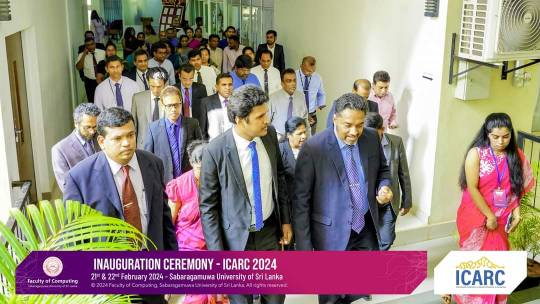
2 notes
·
View notes
Text
Events 3.15 (after 1920)
1921 – Talaat Pasha, former Grand Vizir of the Ottoman Empire and chief architect of the Armenian genocide is assassinated in Berlin by a 23-year-old Armenian, Soghomon Tehlirian. 1922 – After Egypt gains nominal independence from the United Kingdom, Fuad I becomes King of Egypt. 1927 – The first Women's Boat Race between the University of Oxford and the University of Cambridge takes place on The Isis in Oxford. 1939 – Germany occupies Czechoslovakia. 1939 – Carpatho-Ukraine declares itself an independent republic, but is annexed by Hungary the next day. 1943 – World War II: Third Battle of Kharkiv: The Germans retake the city of Kharkiv from the Soviet armies. 1951 – Iranian oil industry is nationalized. 1961 – At the 1961 Commonwealth Prime Ministers' Conference, South Africa announces that it will withdraw from the Commonwealth when the South African Constitution of 1961 comes into effect. 1965 – President Lyndon B. Johnson, responding to the Selma crisis, tells U.S. Congress "We shall overcome" while advocating the Voting Rights Act. 1974 – Fifteen people are killed when Sterling Airways Flight 901, a Sud Aviation Caravelle, catches fire following a landing gear collapse at Mehrabad International Airport in Tehran, Iran. 1978 – Somalia and Ethiopia signed a truce to end the Ethio-Somali War. 1986 – Collapse of Hotel New World: Thirty-three people die when the Hotel New World in Singapore collapses. 1990 – Mikhail Gorbachev is elected as the first President of the Soviet Union. 1991 – Cold War: The Treaty on the Final Settlement with Respect to Germany comes into effect, granting full sovereignty to the Federal Republic of Germany. 2008 – Stockpiles of obsolete ammunition explode at an ex-military ammunition depot in the village of Gërdec, Albania, killing 26 people. 2011 – Beginning of the Syrian Civil War. 2019 – Fifty-one people are killed in the Christchurch mosque shootings. 2019 – Beginning of the 2019–20 Hong Kong protests. 2019 – Approximately 1.4 million young people in 123 countries go on strike to protest climate change. 2022 – The 2022 Sri Lankan protests begins amidst Sri Lanka's economic collapse.
2 notes
·
View notes
Text
Holidays 3.7
Holidays
Alexander Graham Bell Day
Arbor Day (California)
Be Heard Day
Bird Day (California)
Bloody Sunday Anniversary Day (Selma, Alabama)
Chamorro Heritage Day (Guam)
Cybercombine Day (Prudentianopolis)
Doronicum Day (French Republic)
Equal Pay Day (Gleicher Bezahlungstag; Germany)
Finnmarkslopet Dog Sled Race (Finland)
First Planting Festival (Elder Scrolls)
Get Grandma To Write Down Her Meatloaf Recipe Day
Hamilton Lavity Stoutt Day (British Virgin Islands)
International Brick Maker Day
International Day of the Anti-Fascist Woman
International Women’s Day (Angola, Tajikistan)
INTERPOL International Day of Remembrance for Fallen Officers
Jose Abad Day (Philippines)
Liberation of Sulaymaniyah (Iraqi Kurdistan)
Mahasivarathri Day (Sri Lanka)
Maritime Day (Slovenia)
Masaryk Day (Czech Republic, Slovakia)
Maslenitsa (Russia)
National Ben Day
National Carol Day
National Cooper Day
National Day of Lesbian Visibility (Argentina)
National Heroes and Benefactors Day (Belize)
National Sauna Day (Japan)
National Sharon Day
National Slam the Scam Day
National Teresa Day
Neil Diamond Day (Las Vegas)
Nones of March (Ancient Rome)
Plant Power Day (UK)
Say Hello Day
Suez Canal Day
Teacher’s Day (Albania)
Texas Energy Day (Texas)
307 Day
Transport and Telecommunication Workers Day (Turkmenistan)
World Oneness Day
Food & Drink Celebrations
National Cereal Day
National Crown Roast of Pork Day
National Flapjack Day
Punsch Roll Day (Sweden)
1st Thursday in March
Kid Lit Art Postcard Day [1st Thursday]
Nametag Day [Thursday of Name Week]
National Hospitalist Day [1st Thursday]
National Vending Day [1st Thursday]
White Ribbon Day (Massachusetts) [1st Thursday]
World Book Day (Ireland, UK) [1st Thursday]
Independence & Related Days
Aleutian Islands (Declared; 2020) [unrecognized]
Sulaymaniyah Liberation Day (Iraqi Kurdistan)
Festivals Beginning March 7, 2024
Antikmässan (Stockholm, Sweden) [thru 3. 10]
Brazilian Beer Festival (Blumeneau, Brazil) [thru 3.9]
Cincinnati International Wine Festival (Cincinnati, Ohio) [thru 3.9]
Crufts Dog Show (Birmingham, England) [thru 3. 10]
Eastern Bison Association Winter Conference (Harrisburg, Pennsylvania) [thru 3.9]
Fulton Oysterfest (Fulton, Texas) [thru 3.10]
Limassol Carnival (Limassol, Cyprus) [thru 3. 17]
National Coffee Association Convention (Nashville, Tennessee) [thru 3.9]
New England Brew Summit (Portland, Maine)
Red, White & Snow (Park City, Utah) [thru 3.9]
Sustainable Wine Dinner Series (Los Angeles, California)
The WhiskyX (Miami, Florida)
Feast Days
Ardo (Christian; Saint)
Barbara Eden Day (Church of the SubGenius; Saint)
Billy (Muppetism)
Boris Kustodiev (Artology)
Contradiction Day (No It’s Not!; Pastafarian)
The Devil Is God Reversed Day (Everyday Wicca)
Drausius (a.k.a. Drausin; Christian; Saint)
Empodocles (Positivist; Saint)
Edward Landseer (Artology)
Esterwine (Christian; Saint)
Festival for Vedovus (God of the Dead & Volcanic Movements; Ancient Rome)
Impeachment of March Goblins (Shamanism)
José Olallo (Christian; Saint)
Junoalia (Old Roman Festival to Juno)
Leonid Feodorov (Russian Greek Catholic Church)
March Storms and Blasting Rods Day (Starza Pagan Book of Days)
Milton Avery (Artology)
Paul the Simple (Christian; Saint)
Perpetua and Felicity (Christian; Saints & Martyrs)
Piet Mondrian (Artology)
Psyche’s Day (Pagan)
Pierre-Henri Dorie, Siméon-François Berneux (Christian; part of The Korean Martyrs)
Theophylact (Christian; Saint)
Thomas Aquinas, Doctor of the Church (Christian; Saint)
Treachery Day (Church of the SubGenius)
Tuan Reincarnation Day (Celtic Book of Days)
Lucky & Unlucky Days
Sakimake (先負 Japan) [Bad luck in the morning, good luck in the afternoon.]
Umu Limnu (Evil Day; Babylonian Calendar; 11 of 60)
Premieres
Alice the Collegiate (Disney Cartoon; 1927)
The Caine Mutiny, by Herman Wouk (Novel; 1951)
Coal Miner’s Daughter
Foxes (Film; 1980)
The Edible Woman, by Margaret Atwood (Novel; 1969)
Erlkönig, by Franz Schubert (Lied; 1821)
From Genesis to Revelation, by Genesis (Album; 1969)
The Golden Eggs (Disney Cartoon; 1941)
The Grand Budapest Hotel (Film; 2014)
Grateful Gus (Noveltoons Cartoon; 1958)
Highlander (Film; 1986)
The Home Guard (Terrytoons Cartoon; 1941)
The Long Goodbye (Film; 1973)
Mame (Film; 1974)
Mickey’s Grand Opera (Disney Cartoon; 1936)
Mirror (Russian Film; 1975)
Miss Pettigrew Lives for a Day (Film; 2008)
Mr. Peabody & Sherman (Animated Film; 2014)
My Beautiful Launderette (Film; 1986)
The Nude Who Never, by Ted Mark (Novel; 1965)
The Old Mill Pond (Happy Harmonies Cartoon; 1936)
Olive’s Sweepstake Ticket (Fleischer Popeye Cartoon; 1941)
Our Lady of the Flowers, by Jean Genet (Novel; 1943)
Page Miss Glory (WB MM Cartoon; 1936)
Pistol Packin’ Woodpecker (Woody Woodpecker Cartoon; 1960)
Post Office, by Charles Bukowski (Novel; 1971)
A Room with a View (Film; 1986)
Royal Cat Nap (Tom & Jerry Cartoon; 1958)
Sailor Moon (Japanese Anime Series; 1992)
The Six Million Dollar Man (TV Series; 1973)
Stopping by Woods on a Snowy Evening, by Robert Frost (Poem; 1923)
Taboo (Adult Film; 1980)
Things Ain’t What They Used To Be, recorded by Johnny Hodges and his Orchestra (Song; 1941)
Way Out West, by Sonny Rollins (Album; 1957)
Young Americans, by David Bowie (Album; 1975)
Today’s Name Days
Felicitas, Perpetua, Reinhard (Austria)
Bogoljub, Felicita, Perpetua, Teofil (Croatia)
Tomáš (Czech Republic)
Perpetua (Denmark)
Ralf, Raul, Rolf, Rudolf, Ruudi, Ruut (Estonia)
Taika, Tarja, Taru (Finland)
Félicie, Félicité, Nathan (France)
Felicitas, Felizitas, Perpet, Reinhard, Volker (Germany)
Evgenios (Greece)
Tamás (Hungary)
Quintilio, Tommaso (Italy)
Ella, Elmira (Latvia)
Felicita, Galmantė, Rimtautas, Tomas (Lithuania)
Are, Arild (Norway)
Felicja, Nadmir, Paweł, Polikarp, Tomasz (Poland)
Efrem (Romania)
Tomáš (Slovakia)
Felicidad, Perpetua (Spain)
Camilla, Ottilia (Sweden)
Davon, Devan, Deven, Devin, Devon, Devonta, Devonte, Devyn, Dewey, Lothar, Luther (USA)
Today is Also…
Day of Year: Day 67 of 2024; 299 days remaining in the year
ISO: Day 4 of week 10 of 2024
Celtic Tree Calendar: Nuin (Ash) [Day 19 of 28]
Chinese: Month 1 (Bing-Yin), Day 27 (Geng-Wu)
Chinese Year of the: Dragon 4722 (until January 29, 2025)
Hebrew: 27 Adair I 5784
Islamic: 26 Sha’ban 1445
J Cal: 7 Green; Sevenday [7 of 30]
Julian: 23 February 2024
Moon: 10%: Waning Crescent
Positivist: 11 Aristotle (3rd Month) [Thucydides]
Runic Half Month: Tyr (Cosmic Pillar) [Day 13 of 15]
Season: Winter (Day 78 of 89)
Week: 1st Week of March
Zodiac: Pisces (Day 18 of 30)
2 notes
·
View notes
Note
For all we know that Anne and Tim could be gone already to the Maldives, her diary for tomorrow does not show the Oxford farming conference, it only shows the three days in Sri Lanka
The Oxford farming conference was today!
5 notes
·
View notes
Note
"pre-civilization" is a racist term all by itself, as is the idea that migratory populations cannot be indigeneous. indigeneity is not genetic and not innate. it is a relationship with a colonizing entity.
literally every other definition of indigeneity can be weaponised to either 1. justify colonizing a certain people who don't meet the arbitrary standard, for example under your definition palestinians and domari are not indigeneous because they are post-civ and dom are migrants to the region, and 2. can be used to cloak revanchist, reactionary fascism in post-colonial societies in the language of liberation.
i do not know why you need a scholar to tell you this. i usually respect your willingness not to center yourself in these topics as someone who is not currently living under a settler colonial occupation. it is very tiresome to see people opine about indigeneity when they cannot even get the definition of the word right, and then argue with indigeneous people when we correct them.
I agree I shouldn't have used pre-civilization. I honestly feel like "civilization" is a very colonial term that reinforces the myth that societies evolve in a linear progression. I meant the fact that they remained distinct from the kind of later agrarian society that can pack up, migrate and settle elsewhere, whose technologies created expansionism and competition for resources.
I live under extractive colonialism, the Global South exists under colonality, we also need a way of describing that colonization without infringing on the colonization we inflict on others. There has to be a difference between native and indigenous. I want to be clear on what that is and whether it changes with context, because this is not the definition I have understood all my life. I never dispute that you are indigenous because you know your own struggle.
Please understand that I associate the term indigenous that something that when misapplied turns into bloody ethnic violence against your own neighbours. Eelam Tamils are colonized by us but their claim of indigeneity involved massacring Muslims praying in their mosques and forcible assimilation and displacement of Indigenous Tamils. Sinhalese who had also been in the North since the British took over and were part of their communities were expelled by them— were they indigenous? Malayyiah Tamils are kept ghettoised and indentured to the tea plantations they were brought here from India to work a hundred years ago. Many of them are not remaining in Sri Lanka by choice, others feel this is their homeland now. They're indisputably colonized yet I have never heard the term indigenous applied to them. The Veddahs were turned into a freak show by the British which was continued by the Sinhalese post-independence, or forced to leave when the agriculture of the locals deforested their lands— by the natives who had also been there for untold generations and also called themselves indigenous under British colonization. I can't imagine calling them settlers.
So yes, I want to figure out whether I have misunderstood the definition I have seen used specifically to protect the people who have been rooted in to the land they live off of and can't migrate to another place without losing their entire way of life, unlike the rest of us. I want to understand whether it's different according to the ways people are colonized. I'm sorry but neither your identity nor mine confers authority on whether other people conceptualize indigeneity differently and why. This is me telling you why what you tell me doesn't gel with what I know, not that I'm appointing myself the final authority on the subject. Please give me the space to learn about it on my own with academics and sources I know and trust.
#being unwilling to immediately concede to someone else's opinion doesn't mean I'm invalidating you#it means I have reasons why I don't agree right now and need space to learn and process#I am willing to be wrong I just need to know why I would be#this is a bit of traumatic issue for me also because I've only seen people throw this term around to be horrible to each other#instead of protecting anyone#the Veddahs are the only people I know in SL whose culture is closed to protect it#asks#anon#knee of huss
1 note
·
View note
Note
Anne's back at work tomorrow, and then off to the Maldives and then Sri Lanka. I hope we get to see them in the Maldives
She’s back today, at the Oxford Farming Conference! I’m very excited for their Sri Lanka trip, i wonder if they’re actually going to the Maldives? 👀 time will tell
6 notes
·
View notes
Text

For the New Zealand Test team, the past 12 months have been nothing short of a wild trip. Before the three Test matches in India, they had only won one of four series, against a weak South African team. The problems were made worse by Tim Southee resigning as captain following the 2-0 series loss in Sri Lanka. Nobody had given them a chance, either. All went well for New Zealand during the series, as they won crucial moments in all three games after bowling out India for 46 on the opening morning of play in Bengaluru. They accomplished the unimaginable by defeating India 3-0 in a series in India when they had nothing to lose. An accomplishment never before accomplished by a touring team on Indian soil, rendered the more significant by Kane Williamson's exclusion from the series.
With a spot in the World Test Championship final still up for grabs, if other outcomes go their way, New Zealand suddenly has everything on the line once more. If they do not make it to the final at Lord's, this will also be the final Test series for former captain and fast bowler Tim Southee, and the hosts will try to give him a spectacular send-off.
In contrast, England enters this series hoping to recover from their October 2-1 series loss to Pakistan under circumstances they would describe as extremely unfamiliar. On both of their subcontinental trips this year, their strategy of remaining aggressive even in challenging situations with "Bazball" has failed them, as wickets have fallen in clusters even when one batsman got his eye in.
The two-day warm-up game before the series demonstrated the same thing. None of the other batters were able to turn their starts into significant totals, with the exception of Ben Stokes, Joe Root, and Zak Crawley, who each reached a half-century. Tim Southee's Test debut coincided with England's most recent series victory in New Zealand, which came under Michael Vaughan in 2008. After 16 long years, the visitors will feel much more at home on New Zealand's faster courses and try to change the course of history.
When: November 28 to December 2, 2024; 11:00am Local Time | 10pm GMT (Nov 27) | 3:30am IST
Where: Hagley Oval, Christchurch
What to expect: Most days in Christchurch should be gloomy, but there should not be any rain that would stop play. Hagley Oval has historically favored bowlers on the first day, but as four of the top five chases in New Zealand have taken place here, including two in the past two years, it gradually becomes easier to bat on.
Team news
New Zealand: All-rounder Nathan Smith will make his Test debut, while Kane Williamson will take Will Young's spot as Player of the Series in India, according to a news conference held by Tom Latham prior to the match.
Devon Conway, Tom Latham (C), Kane Williamson, Rachin Ravindra, Glenn Phillips, Daryl Mitchell, Tom Blundell (WK), Nathan Smith, Tim Southee, Matt Henry, and Will O'Rourke are the likely starting lineup.
England: Two days prior to the game, the visitors revealed their starting lineup. Ollie Pope will take over after Jamie Smith is unable to play due to an injury sustained during practice, which prevented Jordan Cox from making his debut. Jacob Bethell, a batting all-rounder, will bat at the third position in his Test debut.
Ben Duckett, Jacob Bethell, Joe Root, Harry Brook, Ollie Pope (wk), Ben Stokes (C), Chris Woakes, Gus Atkinson, Brydon Carse, Shoaib Bashir, and Zak Crawley are the confirmed starting lineup.
What they said:
"I followed up after Steady (Gary Stead) spoke with Young regarding it. As previously stated, he is an excellent team player and did nothing improper. Although it was a difficult choice, Tom Latham said, "I suppose that when you are in a position to make difficult decisions, it shows your team is in a good spot, so yeah, obviously heartbroken for Young but thrilled with Kane coming back."
0 notes
Text
[ad_1] Prime Minister Narendra Modi will address a Special Session of the Guyanese Parliament on Friday, marking yet another significant moment in his global diplomatic outreach. PM Modi is visiting Guyana as a part of his three-nation tour wherein he previously was in Nigeria and then Brazil. His visit to Guyana becomes significant as he is the first Indian PM to visit the country in over 50 years. During his visit he will also address the Guyanese Parliament. This will be the 14th such instance when PM Modi will speak on behalf of the people of India in the Parliaments of foreign nations. He holds the distinction of being the Indian PM with the highest number of addresses to foreign Parliaments. Former Prime Minister Manmohan Singh had delivered 7 such addresses while PM Modi has delivered 14 addresses to foreign Parliaments. Former Prime Minister Indira Gandhi had addressed foreign legislatures four times, while former PM Jawaharlal Nehru did it three times. Rajiv Gandhi and Atal Bihari Vajpayee delivered two such addresses while others like Morarji Desai and PV Narsimha Rao addressed only once. Over the years, PM Modi has delivered speeches in legislative chambers across the world, from the Americas to Europe, Africa, Australia and Asia. His addresses, which transcend continents, are a testament to India’s growing influence on the global stage. In 2014, the PM addressed the Parliaments of Australia and Fiji and also addressed the British Parliament in 2015. In Africa, PM Modi addressed the National Assembly of Mauritius in 2015 and the Parliament of Uganda in 2018. In Asia, the PM addressed the Parliament of the joint session of the Bhutanese Parliament and Nepal Constituent Assembly in 2014, the Parliaments of Sri Lanka, Mongolia and Afghanistan in 2015, and the Parliament of Maldives in 2019. Earlier, Prime Minister Narendra Modi was conferred with the highest national award of Guyana, ‘The Order of Excellence’ during his visit to nation on the final leg of his three-nation tour. The Award was presented to him by Guyanese President Mohamed Irfaan Ali. The Order of Excellence, was awarded to PM Modi for his exceptional service to the global community, statesmanship and contribution to deepening the India- Guyana ties. The Commonwealth of Dominica also conferred its highest national honour, the Dominica Award of Honour, upon PM Modi. President Sylvanie Burton presented the award to PM Modi in recognition of his efforts during the COVID-19 pandemic and his dedication to strengthening the relationship between India and Dominica. [ad_2] Source link
0 notes